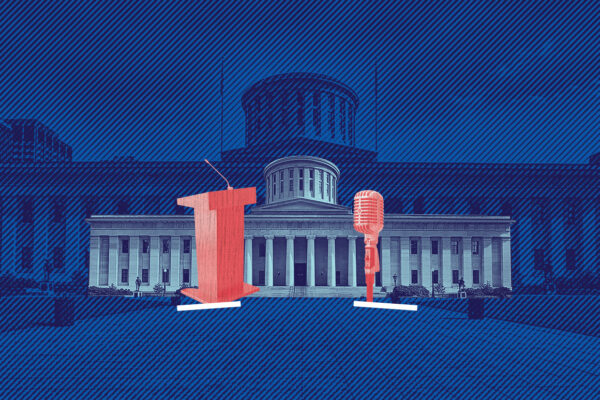To Chairman Willis, Vice Chair Daniels, Ranking Member Grim, and members of the House Transportation Committee, thank you for this opportunity to provide interested party testimony on House Bill 251. The ACLU of Ohio takes great interest in law enforcement and other government uses of surveillance technology, including drones, around Ohio. For many years now, local law enforcement has been purchasing, adopting, and using these technologies with nearly zero statutory restrictions at the local or state level. Indeed, Ohio is truly the Wild West in this regard, seemingly content with allowing these technologies to proliferate without any common-sense regulations to protect the privacy and other expectations of your constituents and all Ohioans.
These other technologies include, but are not limited to, automatic license plate readers, facial recognition, body cameras, gait recognition, cell-site simulators/Stingrays, X-ray vans (Backscatter vans), and more. Again, barely regulated at the local or state levels.
Our hope is House Bill 251 can become the vehicle for reining in the use of at least one of these technologies, unmanned aerial vehicles (UAVs), popularly known as drones.
It is certainly positive HB 251 forbids the use of weapons on, or incorporated with, drones. It is also positive HB 251 contains a warrant requirement for the use of drones to surveil homes and buildings from inside or outside, although the ACLU of Ohio is unaware of any law enforcement use of drones for the interiors of such places. In addition, it is highly likely current Fourth Amendment jurisprudence would require a warrant for the surveilling of interiors. But, including such a prohibition in Ohio law provides belt and suspenders protection.
HB 251 also includes a list of permitted use of drones by law enforcement. These are a mix of situations that allow law enforcement to use this technology without sacrificing privacy but also include some curious provisions.
For example, HB 251 allows drones to “patrol within fifty miles of a national border for purposes of policing that border to prevent or deter the illegal entry of any individual, illegal substance, or contraband.” (Lines #166-168). However, immigration laws are federal laws and the duty for their enforcement lies with federal authorities. Even if Ohio or its local governments were to formally partner, or are partnering, with the federal government via the 287(g) program, that still does not confer upon them the authority to patrol for violations of federal immigration law.
Related, the language about deterring or preventing the transportation of illegal substances or contraband, can be interpreted as giving huge latitude for the deployment of drones anywhere and everywhere across Ohio, even without individualized suspicion of wrongdoing. Accordingly, the ACLU of Ohio strongly opposes this language in HB 251.
HB 251 was also recently amended to explicitly make clear surveillance data is subject to Ohio’s public records laws. To the extent this helps track how and when law enforcement and government use drones, this is a positive inclusion. However, such broad language also means how and when drones capture the travels and whereabouts of your constituents will also be available via these laws. That amplifies the problems with drones. In this case, not only can or will the government potentially know where we travel, at all times, but so will the general public. If this is an unintended loophole, we suggest it be closed. As is, this is an additional provision we strongly oppose.
There are key categories of regulation any legislation or policies to regulate drones should include we respectfully ask HB 251 be amended to include. Briefly, these are:
- Explicit permitted use of drones vs. forbidden uses of drones. As mentioned, HB 251 contains some language in this regard. But it does not, for example, prevent law enforcement from following us to rallies, protests or political meetings, to gun stores or gun shows, to our health providers, to our houses of worship, or anywhere/everywhere else.
- How long data can be kept. A crucial bulwark against government keeping surveillance data for however long they want, for any purpose they deem fit, is fixed timelines for the deletion of captured data. Certainly, for data relevant to an ongoing criminal investigation, such deadlines must provide flexibility. But all other data should be deleted as soon as possible to protect against abuses. Again, HB 251 allows the public to request this data and utilize or publish it however they want.
- With which entities and persons the data can be shared. The concern here is not only can government and law enforcement preserve this data forever, they can also share it with all, including law enforcement and government in other cities, counties, states, at the federal level, and even other countries. Surely, there are some situations where this makes perfect sense for investigations and enforcement. But, current Ohio law and HB 251 make no distinctions.
- Robust reporting requirements also give Ohioans the confidence technology such as drones are being used in ways that do not impact civil liberties, if that is the case.
In short, the ACLU of Ohio believes HB 251 can eventually provide the framework for a more comprehensive bill to adequately regulate the use of drones in and around Ohio. But the bill, as currently written, is not there yet and, as mentioned, contains several provisions which raise serious civil liberties concerns.
The ACLU of Ohio respectfully suggests this committee further amend Amended House Bill 251 to be the best it can be and join those other states that have managed to balance sometimes competing interests in a bipartisan fashion. The use of these technologies without proper restrictions deeply concern our organization and we stand ready to assist legislators and stakeholders, however and whenever, with the goal of common-sense regulations that still allow law enforcement to do their jobs while protecting all of our rights.


